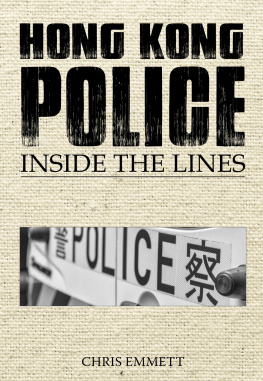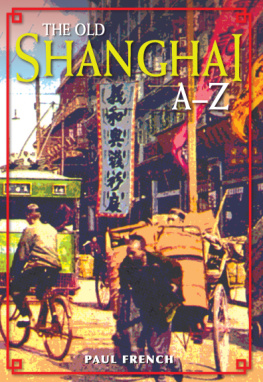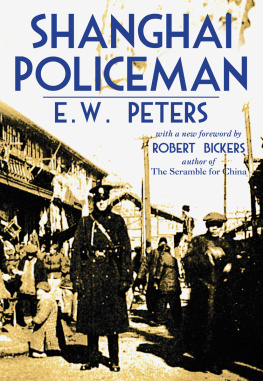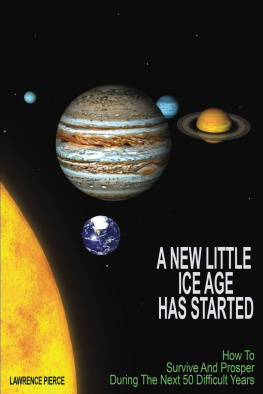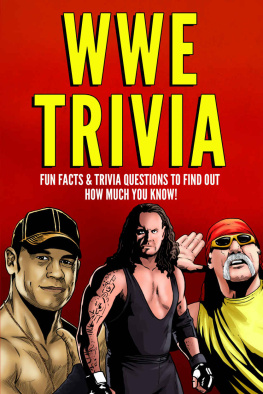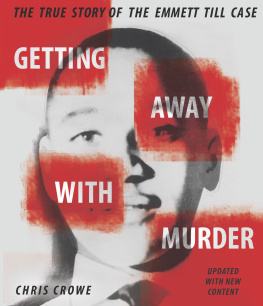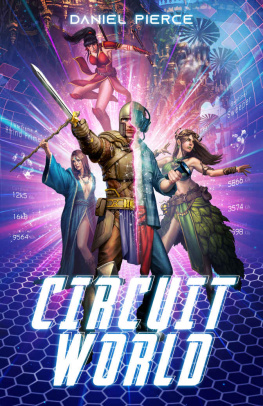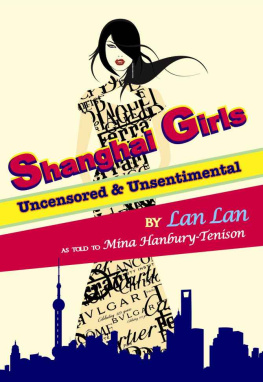This edition is published by BORODINO BOOKS www.pp-publishing.com
To join our mailing list for new titles or for issues with our books borodinobooks@gmail.com
Or on Facebook
Text originally published in 1953 under the same title.
Borodino Books 2017, all rights reserved. No part of this publication may be reproduced, stored in a retrieval system or transmitted by any means, electrical, mechanical or otherwise without the written permission of the copyright holder.
Publishers Note
Although in most cases we have retained the Authors original spelling and grammar to authentically reproduce the work of the Author and the original intent of such material, some additional notes and clarifications have been added for the modern readers benefit.
We have also made every effort to include all maps and illustrations of the original edition the limitations of formatting do not allow of including larger maps, we will upload as many of these maps as possible.
SHANGHAI PIERCE
A Fair Likeness
By
Chris Emmett
WITH DRAWINGS BY NICK EGGENHOFER
And It Grew From That To This
One of my first recollections is that of hearing the bellowing of a herd of bulls just as a spring day drew to a close. Those bulls, so I was told, belonged to Shanghai Pierce.
I was reared in Hamilton, Texas, on one of the spur cattle trails leading across Texas to merge with an extension of the main Chisholm Trail near Fort Worth. There was seldom a setting sun in the spring during the early eighteen nineties that did not shine upon a drover watering his stalking, bawling longhorn cattle in the little stream which flowed through that frontier town. That water, like the stream of hooves and horns that flowed northward with the rise of April grass, has long since ceased to flow; but the low of thirsty cattle and the bellow of menacing bulls are as fresh in my mind today as when I left my castle-building and pinfishing in a childs fright to scud to the protection of my mother so that Shanghai Pierces sealions could not harm me.
Soon after those bulls brought me to a consciousness of the world around me, I began to inquire about ownership. I wanted to know who would want such ferocious things. And it seemed to me, according to the talk I heard, that all ownership of cattle centered around Shanghai Pierce. There was an aura of mystery about the man, for cattlemen referred to him in respectful terms. I absorbed it and thought of him as a colossus of irresistible strength, king of an empire, a man whom cattlemen sought to emulate. That I may have gained such impressions by having seen him I cannot say after the passing of more than half a century. I may have seen him; I do not know whether I did or not. Perhaps my impressions arose from the then common cattlemans gossip about the man. I was too young to formulate for myself the impressions of character I retained of him. I pictured him in my mind as loyal to his friends, ruthless to his enemies, faithful to his commitments, a czar in my community.
Loyalty and reliability were valued qualities in men of the day of my youth. Fathers with an interest in the development of their sons impressed them with the importance of both. And Shanghai Piercethat phantom who moved northward with large herds of cattlesymbolized those qualities in my consciousness, and, without intervening color of facts, the picture of the big man remained as I grew to manhood.
Many years later these early impressions came to life again when a change of residence brought me by chance one evening to Blessing, Texas. On the porch of an unpretentious hotel sat a long-moustached, gruff, talkative old man. He squared himself in his rocker upon my arrival and overawed me with local thrillers of the days gone by. Until I learned that he was Jonathan Edward Pierce, brother of the famous Shanghai, I had been inclined to cast him off as an inconsequential, talkative old man eager for a listener; but when I came to know he was both brother and partner of the colossus of my youthful imaginings, my interest soared.
Later through the kindness of Jack Hutchins, then in the employ of The Pierce Estatesubsequently president of A. H. Pierce Ranch, LimitedI sat one day in the shade of the A. P. Borden Company mercantile store, at Pierces Station, Texas. There a withered old chocolate-colored Negro, Neptune Holmes, pensioner of the Pierce Ranch, was whiling away his extra allotment of days upon this earth, and I had from that inimitable character, who had been Shanghais faithful servant, some of his oft-told tales. An acquaintance with Mr. Abel Pierce Borden, most beloved of the nephews, and with banker George C. Gifford, another nephew, added much color (but few facts) to my growing interest in the life of Shanghai Pierce. Those reticent gentlemen frowned upon inquisitiveness into private lives, whether theirs or that of their better-known uncle. Mrs. Edith Borden Greer added immeasurably to the facts as well as to the glamour of her great-uncle; and Ranch Boss Clay McSparren, as well as W. B. Grimes, son of the man Shanghai despised, Bing Grimes, furnished intimate details of the acts of old Shang, as he was known by his close associates.
J. Evetts Haley, onetime archivist of the University of Texas, and Jack Hutchins saved the Pierce Papers, which had survived storms and time. Thus hundreds of documents and letters became a part of the library of the University of Texas. Through the genial sufferance of Miss Winnie Allen, custodian, every paperthe first bearing the date, April 7,1870, the last telling of Mr. Pierces death, Christmas night, 1900has passed under my scrutiny. This day-by-day record of Abel Head Pierces life was supplemented by Judge J. C. Hutcheson, Jr., of the United States Court of Appeals, James V. Allred, onetime Texas governor, and United States Senator Tom Connally, who made valuable court records accessible to me.
Ranking with the most helpful in my quest have been members of the San Antonio library staff, Miss Grace Phillippi being ever untiring in her search for a connecting link to a fugitive fact in this story. Russell E. Ward and his mother, relict of Mr. Benn, read the manuscript to give me the benefit of their recollections. A host of Mr. Pierces old hands, both black and whiteincluding Old Idar (Ida) and Viwere most helpful. Mrs. Arda Talbot Allen, Matagordian by birth, rummaged ceaselessly through the memories of her kin and friends (and whoever had more of both?) to lay another Shanghai story at my door. Fred and Janette Lowrey were indispensable critics of the manuscript. All these and many more contributed to the resurrection of Shanghai Pierce, Webster on Cattle.
Chris Emmett
San Antonio, Texas
1953






